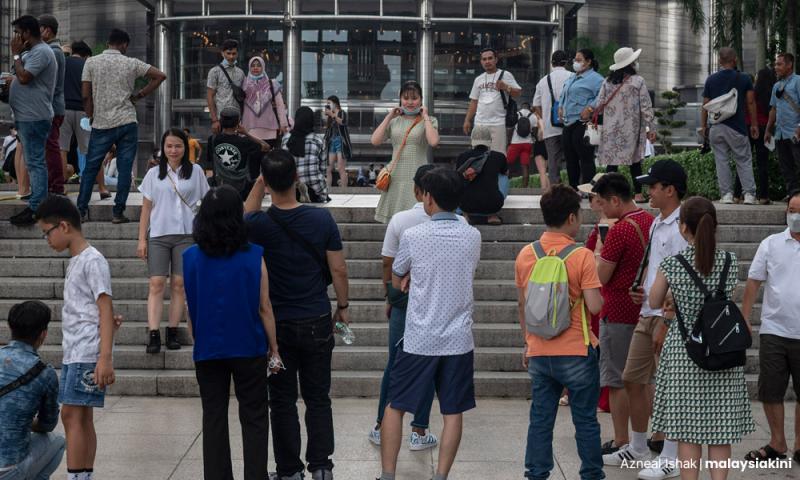LETTER | Beware of cheap or free tours
LETTER | Since the outbreak of Covid-19 in early 2020, there have been 761,402,282 confirmed cases and 6,887,000 deaths globally, as posted on the World Health Organization’s website.
Travel restrictions and lockdowns have resulted in many legitimate businesses suffering greatly, and exploitative activities were similarly curtailed. Tourism hit rock bottom in 2021 and started to recover in 2022.
In Malaysia, tourist arrival figures for the first quarter (Q1) of last year were only 98,053. But after international travel restrictions were lifted in April and Covid-19 conditions eased in May, it rocketed to 2,034,107 in Q2.
The number shot up to 3,424,121 in Q3 and 4,514,683 in Q4, ending the year with 10,070,964 tourists – a far cry from only 134,728 in 2021. In comparison, the number of tourists to Thailand last year was around 11.5 million, not much higher than in Malaysia.
However, the Thai government is expecting 25 to 30 million foreign tourists this year, much higher than the 15.6 million for Malaysia as targeted by Tourism Malaysia in its January forecast, or the 16.1 million announced in February by the tourism, arts and culture minister.
But following the opening of the Chinese border to international travel without restrictions on Feb 6, 2023, the Thai Ministry of Tourism and Sports has discovered several travel agencies in China are advertising travel packages that are significantly below tour operating costs.
Such packages were often referred to as ‘zero-dollar’, ‘zero-fare’, ‘zero-fee’ or ‘zero-cost’ tours but are technically incorrect. If offered free of charge, they would have raised red flags. Instead, the packages were sold at a substantial discount that bargain hunters find hard to resist.
And not everyone is smart enough to know there is no such thing as a free lunch. Naïve tourists will be shepherded to buy from shops that later pay out commissions to be shared by the outbound tour operator, tour leader, inbound tour operator, tourist guide and bus driver.
Tourists will initially be coaxed to buy and if persuasions were to fail; insults, threats and other forms of pressure will be applied. Anyone in a foreign land would feel vulnerable without safe passage. It is like being trapped inside a prison without walls.
Zero-cost tours started in the 1980s when inbound tour operators in Singapore provided airport transfers and sightseeing for tour groups without charging outbound tour operators in China, confident that they could recoup operating costs and profits from shopping commissions alone.
At one time in Malaysia, some enterprising freelance tourist guides would pay inbound tour operators for the chance to handle tour groups from China, instead of being paid guiding fees which is the normal practice.
Before the pandemic, unsuspecting foreigners were drawn to join cheap tours departing from a major city such as Beijing. Some event organisers in Malaysia bought such packages and gave them away as lucky draw prizes to attract larger crowds to their events.
In 2019, a Malaysian couple was thrilled to win a seven days and six nights tour to China and gladly bought their return flights on a budget airline, which was then very affordable. Upon arrival, they checked into a five-star hotel and happily signed an agreement to join the tour.
However, the quality of hotels from the second night onwards left much to be desired. Not only that, but insults were thrown at them for not buying enough from the many shopping stops included in the daily sightseeing tours.
On the third day, they could not stomach the tour any longer and gave notice to opt out of the tour. This was when they were shown the agreement they had signed earlier, requiring them to pay the full cost of the seven days and six nights package for cancellation and the amount was substantial.
The poor couple was caught between a rock and a hard place. In the end, they decided to continue with the tour and buy much more, rather than coughing out a large sum as compensation and getting nothing out of it.
We ought to be vigilant not to allow tourism to rear its ugly head in Malaysia and we should be wary of cheap tours overseas. Apart from outright scams where there is no show after payments have been made, it can be risky to bypass local tour operators to look for bargains.
And remember, if the price seems too good to be true, it probably is. While goods may be sold off cheaply nearing their expiry dates or have gone out of fashion, the same cannot be applied to promissory services that have yet to be delivered.
Always adopt the maxim of paying others reasonably for their services, just as we expect others to pay us fairly for our labour or salaries. Those who don’t are not treating others equitably and could easily fall victim to scammers.
YS CHAN is a master trainer for Mesra Malaysia and Travel & Tours Enhancement Course as well as an Asean Tourism Master Trainer. He is also a transport and training consultant and writer.
The views expressed here are those of the author/contributor and do not necessarily represent the views of Malaysiakini.
RM12.50 / month
- Unlimited access to award-winning journalism
- Comment and share your opinions on all our articles
- Gift interesting stories to your friends
- Tax deductable
